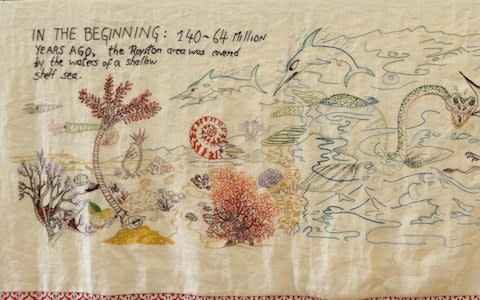Embroiderers' epic labour of love delivers a stitch in time to rival Bayeux

Britain’s own version of the Bayeux Tapestry has been unveiled, almost three decades after residents of a Hertfordshire town began stitching a record of their local history starting 140 million years ago.
More than 60 volunteers contributed to the Royston Tapestry, a handmade embroidery made up of 15 painstaking scenes across 25 metres (82ft) of linen. Started in 1993, the epic work has grown to include tableaux ranging from prehistoric monsters to Roman residents, with depictions of the Black Death and a royal kidnapping.
The tapestry was unveiled last week at Royston Museum and has so far been viewed by more than 1,000 visitors.
“It’s incredible, it’s a wonderful example of how important local history is on a national scale. It tells stories every local town across England can relate to,” said Madeline Odent, the museum’s curator.
“We had someone walk in at the weekend and they just stopped dead. There have been people who have been in Royston for years who are thrilled to see what they have heard about for so long.

“They are just amazed at the quality of the work and the time and effort that has gone into it.”
The Royston Tapestry begins with an imagined vision of the area under a primeval ocean 140 million years ago. The story then moves to the Bronze Age and the construction of burial mounds that still overlook the town from the surrounding hills.
It continues with the construction of Ermine Street, the Roman road from London to the North, before reaching the Middle Ages with an image of Halley’s Comet at the Norman Conquest – a nod to its more famous forebear’s depiction of the Battle of Hastings.

Later scenes show the Black Death, the visit of Cardinal Wolsey, the Dissolution of the Monasteries, and a tableau showing the kidnapping of King James I’s dog by townspeople – who took umbrage with the cost of hosting his court. The dog was returned unharmed with a petition reminding him how much Royston paid when his hunting lodge was in full swing.
The tapestry finishes in 1742 with the discovery of the mysterious Royston Cave, a chamber hollowed out of the chalk, its walls covered in carvings long linked to the Knights Templar.
Although the project was completed in 2018, the original plans earmarked the tapestry to end in 1991, thereby fuelling speculation it could be added to.
“If my successor wants to pick it up and take it to the next few hundred years they are more than welcome to,” Mrs Odent added.
Want the best of The Telegraph direct to your email and WhatsApp? Sign up to our free twice-daily Front Page newsletter and new audio briefings.

 Yahoo News
Yahoo News 
